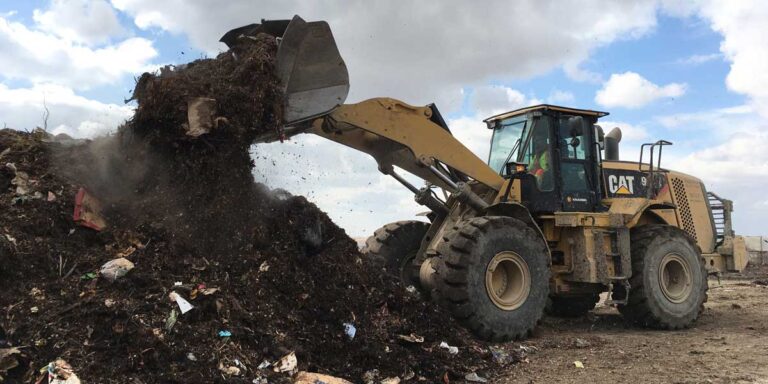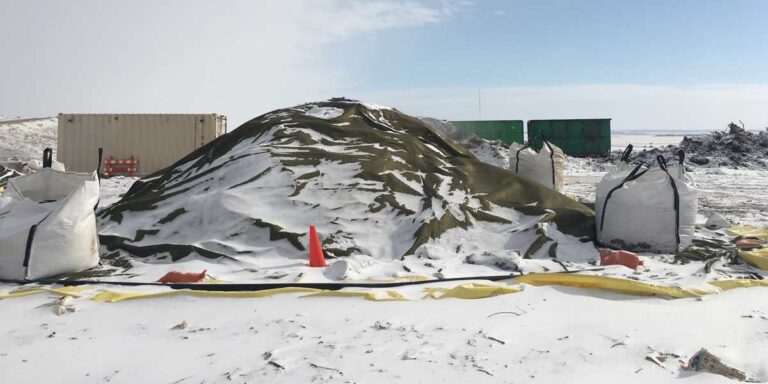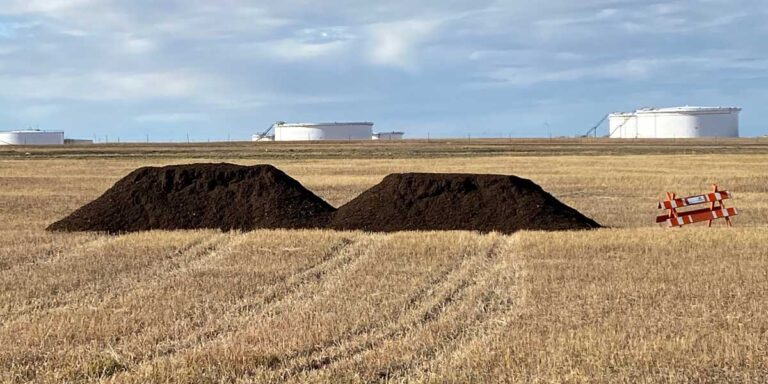City of Regina
January 26th, 2022
Profiles in Achievement
Many fascinating and important projects are worked on by members of APEGS.
It is important that we tell these stories to amplify awareness of what Saskatchewan engineers and geoscientists are contributing to the province and the world.
In late 2021, members of APEGS were asked to share details and photos of their projects from that year for the annual Profiles in Achievement issue of The Professional Edge.

Photo courtesy City of Regina
A front-end loader flips waste that has been covered for weeks to create a new pile before finishing the active composting stage.
The organization
The City of Regina is a municipal government that provides more than 60 services that residents depend on every day to a population of nearly one-quarter million. The City of Regina has a strategic plan that helps make decisions, allocate resources and determine the future direction of the organization. Its vision is to be Canada’s most vibrant, inclusive, attractive and sustainable community, where people live in harmony and thrive in opportunity.
The achievement
Organic waste, including food and yard waste, makes up about 50 per cent of the average Regina resident’s garbage cart. When organic waste is sent to the landfill it decomposes in an anaerobic environment and produces methane, a potent greenhouse gas which is difficult to effectively capture in a landfill environment.
An important step to becoming a more sustainable city, was to implement a citywide organic waste collection program, beginning with a one-year curbside Food and Yard Waste pilot in September 2020 to determine how to best design a program for the residents of Regina. The goal of the program is to improve the amount of residential waste diverted from the landfill, decrease the corresponding greenhouse gas emissions in the city and create a useable end-product that contributes to a circular economy.
This new service is part of the City of Regina’s long-term solid waste management plan, Waste Plan Regina, to send less waste to the landfill and reach the 65 per cent residential diversion target.
Selecting households for participation was key to ensure the pilot group were representative of the city’s population. Those selected were chosen based on a number of factors including house types, yard size, income levels, family size and waste collection methods to ensure they represented Regina as a whole. There were 2,800 households selected for the pilot with a mix of front street and back alley collection. This represents about four per cent of the total households in the city, which is typical for a pilot project service.
Most large municipalities in Canada already offer curbside collection of organic waste for residents, although there are different configurations of these programs across Canada. To determine which program configuration would be most suitable for Regina, the project team interviewed other municipalities to better understand the options available and the benefits and challenges identified by those currently offering the service.
Through these interviews, the project team identified how to develop a program that would work in Regina based on the city’s climate, infrastructure and resident priorities. The City’s pilot service accepted “scrape the plate food waste,” co-mingled with yard waste, in a cart collected by an automated collection vehicle. Other options included manual collection of smaller “food waste only” carts with a separate seasonal yard waste program or co-collection of food waste and garbage collected with split trucks.
Each potential solution had unique challenges and opportunities. The benefits of accepting “scrape the plate food waste” are that it is the easy to understand and communicate, which can often be a challenge with source-separated diversion streams, such as recycling, and it increases the amount of waste that can be diverted from the landfill by accepting more items. There are also challenges associated as it includes meat, dairy, bones and grease which require a more complex processing system to ensure requirements are met for pathogen removal and to avoid excess negative odour or pest concerns at the processing site.
There is also a challenge which arises from having food and yard waste co-mingled in one cart. The benefits of co-mingled food and yard waste include that it is easy for residents to only have one cart and that automated collection is cost-effective and safe. The challenge is that it creates a large variation in waste volumes and composition throughout the year as the volume of yard waste generated at residential households is high from April to November, and minimal during the winter from December to March.
To address these challenges, the project team required a processing solution that could effectively handle “scrape the plate food waste” without generating unwanted odours which could impact the public perception of organic waste processing facilities.
Other important factors included that the processing solution needed to ensure successful removal of pathogens to create a safe, useable end-product and be flexible to waste volume and composition variations in the incoming waste stream. Finally, the implementation of the processing solution needed to meet the approved project timeline.
The project team was able to implement a pilot scale organic waste processing site at the City of Regina landfill using the GORE ® Cover Composting System. The pilot processing site was situated on the City’s existing landfill in an area that already contained a leachate collection system and an existing Permit to Operate from the Ministry of Environment that was amended to include the operation of the pilot processing site.
This simplified design and planning requirements, helped to meet the required project timeline with no delays associated with permitting, as well as minimized costs associated with additional environmental controls.
The site location, small scale and flexibility of the system facilitated operation by City of Regina Landfill staff, who were able to use existing equipment and staff resources to manage the site as part of the regular operations of the Regina Landfill.
The Gore ® Cover system was well-suited to meet the City’s needs for flexibility, odour control and pathogen removal. The covers use patented technology to create a closed system similar to an in-vessel operation that seals off the active composting pile from excess water and allows for effective air circulation in the pile.
The system includes blowers connected to a perforated HDPE pipe to add oxygen to the organic waste, which is key to the composting decomposition process. Waste stays under the covers for three to eight weeks at a time, depending on the rate of incoming material, then is flipped using a front-end loader to create a new pile for another three to eight weeks before finishing the active composting stage.
The flip allows the waste that has settled to move, creating new pore space for oxygen and moisture to move throughout the pile ensuring all waste is effectively composted. To ensure high-quality compost is achieved, the finished product undergoes a curing process where it rests uncovered for a minimum of three months to ensure no more biological activity is present before it is screened and tested according to the Compost Quality Alliance (CQA) standards.
As a way to thank residents who participated in the Food and Yard Waste Pilot, as well as emphasize the benefits of creating useable end products over landfill disposal, the finished compost will be made available to residents in the pilot areas.
A key component of the Food and Yard Waste Pilot was the trialing of three different cart sizes for the food and yard waste green carts, and two different cart sizes for garbage carts, within the three scenarios assigned to different groups throughout the pilot areas. The scenarios were assessed based on resident feedback through service requests and surveys, as well as through the quarterly curbside waste audits.
By assessing the different scenarios according to criteria including weekly cart per cent full, bi-weekly cart per cent full, weekly set-out rate, set-out rate over two weeks, and food and yard waste capture rates, the project team determined that a 240-litre green cart would be most suitable for the curbside Food and Yard Waste program. The 240-litre green cart effectively captured both food and yard waste, whereas the 120-litre green cart was only effective at capturing food waste and the 360-litre cart was only effective for capturing yard waste. Additionally, the 240-litre cart was proven to meet set-out and fullness requirements, according to the data from the waste audits.
Educating the participating households on the new service was essential. Before the pilot began, the City issued a notification letter and held three virtual information sessions with participants. When green carts were rolled out, a welcome package was included that explained how to use the service, provided a collection calendar, included tips for reducing food waste and a magnetic sorting guide for the fridge. A small waste bin was provided to keep inside the home to conveniently dispose of kitchen scraps before placing material into the green cart.
This pilot allowed households to try the service and provide feedback on their experience. Households were encouraged to sign up to participate in an online engagement community through the Be Heard Regina tool.
Through Be Heard, they received updates, newsletters, participated in surveys and asked questions to City staff throughout the pilot. After a successful pilot, Regina City Council approved the implementation plan for the food and yard waste service to be rolled out in fall 2023. This service is expected to extend the life of Regina’s Landfill, reduce greenhouse gas emissions and process the material to create a useable end-product.
The team
Engineers were one part of the project team which included employees from departments including communications and engagement, waste specialists and business administration.
The City of Regina’s Manager of Environmental Services, Garret Ruiters, P.Eng., was the project manager, and Kurtis Doney, P.Eng., Director of Water, Waste and Environment was the project sponsor. Keneni Debia, Engineer-in-training, served as Waste Processing Lead and Performance Measurement Lead. Greg Kuntz, P.Eng., Manager of Energy & Sustainability was on the project steering committee, as was Faisal Kalim, P.Eng., Manager of Solid Waste Operations.

Photo courtesy City of Regina
The Gore® Cover system uses patented technology to create a closed system similar to an in-vessel operation, sealing off the active composting pile from excess water and allowing for effective air circulation in the pile.

Photo courtesy City of Regina
The finished product undergoes a curing process, resting uncovered for at least three months to ensure no more biological activity is present before it is screened and tested, according to the Compost Quality Alliance (CQA) standards.